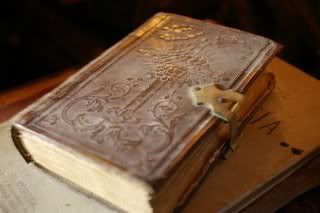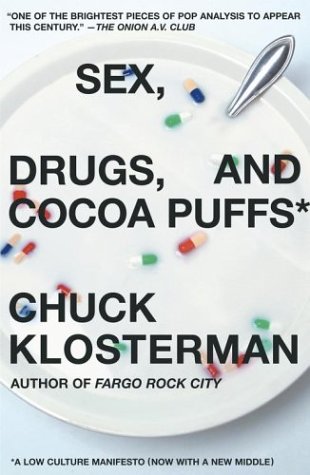
This review is actually just a combination of different things that I sent to CL about what I thought of this book a long time ago. Because of that, and because of the fact that this book was ridiculously sad, it is probably more personal than my other posts. I don't think I'll edit it too much, though. I know I had lots of things to add to it back then, but I can't even find the email exchange in which this ramble originally existed, (which distresses me in many ways, but hey, this isn't my livejournal) so it's good I have this much saved here from when I started this entry in May, at least. I think this post would be different if I wrote it from scratch right now, but I am too fond of my earlier self to inject my current (somewhat happier) viewpoint on these things. So mostly this one's for me, but it's really long and incoherent and has spoilers, so you probably won't read it anyway. What you should get out of this post, though, is that life is hard and you should read this book.
I am rusty with the in depth book analysis, as my blog is more like "it was cool" or "it sucked," but then again I haven't been reading this sort of thing recently. It took me a little bit to get into it. It is true that the liking of them sneaks up on you. I was sort of ambling through the book waiting for "the good part" and then all of a sudden I realized I cared about them a lot. I liked the writing throughout, so that kept me going, but at first it seemed to be going pretty slow. So Yates had to sort of sneak up the caring about the characters on me. And the whole not much happening thing makes sense, because you are probably supposed to feel the suburban monotony and all that.
Some things seemed a bit heavy handed at first, like the whole part about the crazy man is the only one who can REALLY see the truth behind the situation. But actually it might just be because I have 60 years of historical hindsight (and a sense of unwarranted moral superiority that comes from having grown up in the woods) to know that suburbia blows. April and Frank don't have that benefit, because suburbia just started its long reign of blowing, and they had to figure it out for themselves. So at the time I'm sure it wasn't as obvious.
It made me ache to see them in such detail. They were so real. Frank more than April, but that's probably only because we see everything from his mind up until April has her day, and then all the things that before made her annoying (thoughts about her parents, her emotional silent treatment bit, etc.) just made her seem so small and sad and human. But even just the way Frank's inner monologue went made him seem real. Yates put in a lot of things people say to themselves that they don't really talk about. Like the whole imagining the future reactions of April to what he'll tell her about his day, the way he analyzed his movements and his words as though he were on stage, and all the secret weaknesses he had that he tried to hide. Like how occasionally when Frank thinks of himself in 3rd person he is sort of mapping out his next move as though it were onstage. They started out as regular sounding people with an understandable and possibly attainable goal of getting away from it all, and as the story progressed, the responsibility that they began shouldering, all the adult decisions and actions they took built and built and then all crumbled and they just seemed so sad and underinformed and young. They were just trying so hard not to suck, but they failed.
I'm not sure where the blame should lie, either. It is partially the fault of the societal system, for somehow expecting them to be happy in that life. It is also partly the weight of the expectations of the past. The previous generations did a lot of irresponsible European traveling and decadent Sun Also Rises shit, and they (mostly April) have that to contend with, but they also have the expectation that now hard work and dedication will get you where you want to be, like with Frank's whole daddy complex. So they have those issues to contend with, and they are ill equipped. I think SJs (yeah I bring Myers Briggs into everything) can usually be happy hangin out in the stereotypical societal role laid out for them. Frank I think is an INFJ, and April an ENFP. I haven't thought about this a lot, though, so I could be wrong. Point is, they are not SJ.
But suburbia hasn't been around long enough for there to be a clear route or much of a (what's the word- starts with a P, they use it in court to mean "oh well we ruled that way last time so I guess we can do it again" goddammit what is it) to base their decisions on. It's like it takes a few years past being in a decade to be able to define it. I remember in 1999 I thought "What will the defining characteristics of the 90s be? everything seems so normal and boring and undefinable." And right now, I have similar thoughts about the 00s, but by 2004 or so the 90s had a very distinct flavor, and I'm sure that if we make it to 2014, so will the 00s. The point is, they had no idea they were stuck in the shitty Pleasantville 50s. If you look at it as the book telling you "suburbia sucks and steals your soul," then you will respond by saying "well, yes, I knew that." I think you get more from it without focusing on it being Suburbia that did them in. Suburbia does blow, yes, but it is still possible to live a fulfilled life within it (I assume, but I am not about to test this theory). I think that you aren't supposed to blame it on suburbia, because they didn't know. And more obviously, Yates didn't know. Because Suburbia hadn't been around enough to be that big dumb thing in the 50s.
I am not going to lie, though. I am a large hater of suburbia. I am also a large hater of cities, but I understand a little more why people like those. The concept of an ice cream man and playing street hockey with all the neighbor kids does sound cool, but I will staunchly claim that me hanging out by myself making forts and bottling the juice of a Jewel Weed plant for its healing properties was a million times better. I guess it is unfair to blame it all on suburbia, but I don't think I did that. Just don't go giving suburbia undeserved credit just to make up for all the shit it gets. It does get stereotyped, mostly because it is that one thing that stands out about that part of American history. So it deserves the stereotype? I guess I am saying that April and Frank still could have succeeded and it was mostly their own damn fault they failed, but still.They had no idea this was a typical plight that would define their generation. They just knew "Oh god, this sucks. I want to leave but I don't know how."
So for that I really fucking felt for them.
The ending was really good, too. I knew that something big would have to happen, and although I was rooting for them the whole time, I knew they'd never make it to Europe. As it happened, the ending was perfect in its sadness. On the back of my (tied for first with Catch 22) favorite book, At Swim, Two Boys, one of the reviewers says something like "blah blah richness of scope and ambition that makes one reluctant to come to its tragic and inevitable close." Wow, you know you've read a book a lot when you have the reviews memorized, too. Anyway, point is that I always think of that "tragic and inevitable close" thing when other books pull it off, too. There's really nothing else that could have happened to April and Frank.
Yates does the whole "what if" bit, talking about how little things could have changed the outcome, which is true, but of course those little things happened the way they did because they had to. They were doomed from the start. Which really sucks. But it was beautiful that way. Of course she would rather die trying to be herself than live the shitty way she was living, and of course Frank would hurt for a while but then find an easy and dull comfort in burying himself in the very life he originally was trying to get away from.
It was especially pertinent and emotionally murderous to me because of my current life crisis. Of course, everyone sees their crisis as new and different from anyone else's, but just like Frank and April weren't the only ones who thought their road was strikingly unrevolutionary, I am not the only graduate who doesn't want to go get a real job or some shit. But in the moment, in the glaring face of stifling mediocrity, no one can help but see their struggle as singular in its importance.
So it killed me with really really quality writing, and it also killed me by being really terrifying and raising lots of unpleasant questions about the future. I am terrified that I will end up settling, bit by bit without noticing, for something comfortable. I have no large reason for feeling that way- I've actually done a large number of cool things in my past, and I have no reason to think I will be unable to continue them. But still the difficulty of finding something fulfilling and lucrative to do, the difficulty of somehow locating and not hiding from a boy that I share both viewpoints and life goals with, the difficulty of staying with said mystical boy for more than 2 years (my record, set in high school), the difficulty of creating new people that will not only feast upon my innards for 9 months but will require intellectual and physical guidance for the rest of my life, and doing it all (because I really do want to do these things) without feeling trapped inside some cliche white picket fence. I know it is possible, because I have seen it done. It just looks real hard. So I hoped a lot that Frank and April would get their shit together and live with a beautiful purpose. But they didn't, and I knew they wouldn't, and it wouldn't have been as good a book if they'd succeeded. But goddamn, somebody needs to or else I am going to go crazy.
Pages: 337
Time: April 10-14 2009
Rating: 9.75













